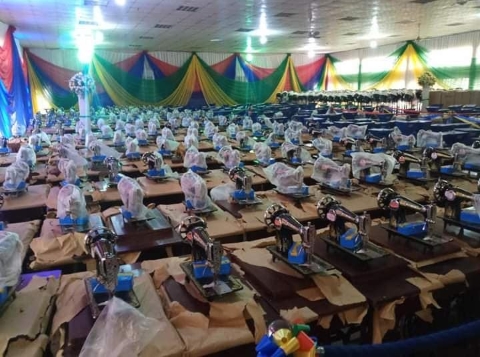profile/81Screenshot_20200703-1752532.png
Sammy01

LASG Empowers 1,100 Vulnerable Women, Residents With Working Tools
~2.3 mins read
Lagos State Government today provided economic support in the form of working tools to 1,100 vulnerable women and residents, who have been affected by the effects of the COVID-19 pandemic, in order to get them back on their feet to provide for their families.
Speaking today at the Y2020 Mega Empowerment Programme held at the Skills Acquisition and Vocational Training Centre, Isheri, Governor Babajide Olusola Sanwo-Olu, represented by his deputy, Dr Kadri Obafemi Hamzat, stated that the programme is a significant step forward as the current administration continues to deliver palliatives for the economic empowerment of the most vulnerable and indigent residents across the five administrative divisions of the State.
The Governor said, “We shall be distributing economic and material inputs including sewing machines, pepper grinders, pop-corn machines, hairdryers, barbing sets, generators and other essentials to support 1,100 vulnerable women and indigent residentsâ€.
“These items will enable the beneficiaries leverage on the various skills acquired and other vocational training support which has been offered to guide them in the transition period of post-COVID-19 pandemic towards adjusting to life in a new ‘normal’ situationâ€, he said.
Sanwo-Olu stated further that the government would continue to support the Lagos State Employment Trust Fund so that it can be more impactful, especially in alleviating the effects of poverty through the provision of critical financial and other support that will enable a significant number of the youths, including unemployed graduates, vulnerable women and pensioners fulfil their entrepreneurial dreams.
Emphasising that the Ministry of Women Affairs and Poverty Alleviation will continue to receive support from the State, Sanwo-Olu gave assurance the skills acquisition centres will always be enhanced to meet the yearnings of the target population.
In his words: “We will also not relent in developing strategies that will ensure the economic empowerment and social integration of our people into the wealth basket. I enjoin you all to continue to support our administration by complying with established safety protocols, even as we gradually lift social restrictions that have altered the way we have been living in the last few months.â€
The Governor, therefore, commended Lagosians for their resilience and fighting spirit in joining the State government in its quest at containing the spread and fatality of the COVID-19 pandemic.
Earlier, the Commissioner for Women Affairs and Poverty Alleviation, Mrs Cecilia Dada disclosed that 17,752 persons have so far benefitted from the empowerment programme since the inception of the Governor Babajide-led administration in Lagos State.
She stated that the programme was in fulfilment of the promise by Governor Sanwo-Olu at the maiden edition of the empowerment programme to make it a continuous one in order to meet the 20,000 targets of the administration.
Dada restated the government’s belief that women empowerment is a crucial pillar of sustainable development and poverty alleviation, hence all efforts are geared towards accelerating the economic empowerment of women in Lagos.
She added that the Ministry will continue to initiate and sustain programmes and activities within its ministerial mandate to raise the living standard of women and all others in the State.
profile/81Screenshot_20200703-1752532.png
Sammy01

Trump Evacuated From Daily Briefing Due To Shooting Outside The White House
~0.9 mins read
President Donald Trump was escorted from the daily Coronavirus news briefing at the White House on Monday,later saying a Shooting had Occurred just Outside the White House.
Just a few minutes later, Trump returned to the briefing room, saying there had been a Shooting outside the White House. The president said the Secret Security service shot someone who was then taken to the hospital, Trump didn't have any details on the shooting except that the person was armed.
"There was shooting outside of the White House and it seems to be well under control" he said. "I'd like to thank the Secret service for their always quick and effective work."
Trump said he was taken to the Oval office and that he had high Confidence in the Secret service. He appeared unfazed on returning to the briefing room and said he wasn't perturbed by the episode.
"Do I look rattled?" Trump replied to a reporter's question.
Ever since the protests started springing up the front of the White House earlier this summer, Security Service have constructed heavy barriers around the White House grounds. The building which is normally easily viewed from multiple points open to the public,is now surrounded by heavy layers of fencing and walls.
Advertisement

Link socials
Matches
Loading...
